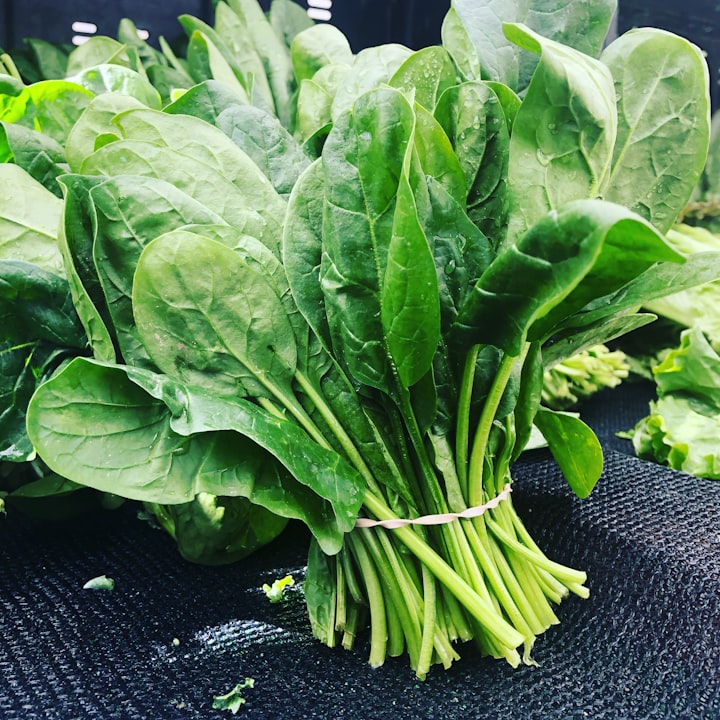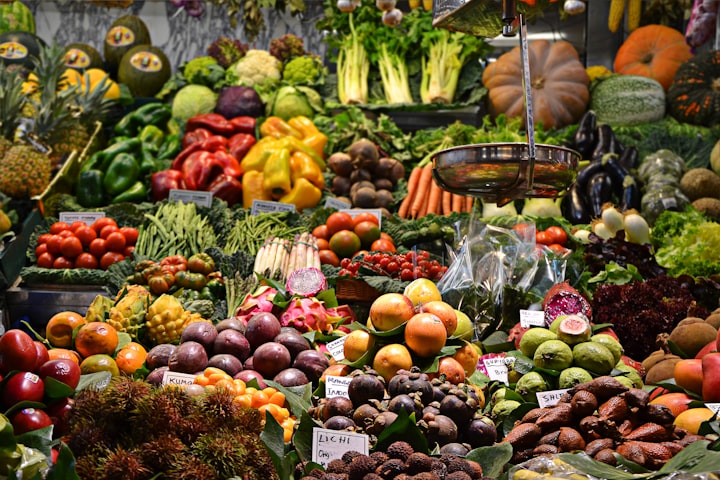Covid-19 — Nutrients To Boost Your Immune System
Eat the right nutrients to boost your immune system
To maintain good overall health, it is important to have the right nutrients in your diet, get enough rest each night, and exercise reasonably regularly.
With the COVID-19 outbreak more than ever, it is important that we are doing everything we can to improve our immune system during this crucial period with the right nutrients.
Making sure you are eating a diet rich in immune-boosting nutrients is one way you can take an active role in preserving your health and wellbeing.
When you eat foods that come from whole foods, such as fruits and vegetables, your body does more effective work of breaking down nutrients; this helps you to use and consume more of them.
Having all the nutrients you need without getting too much of one or two from a small amount is much more valuable than relying on only one or two. Selecting a fun plate with a range of options from the suggested menu will help you have a better day.
Vitamins To Boost Your Immune System
1. Vitamin C — Citrus Fruits & Greens
Foods rich in vitamin C such as grapefruits, bananas, tangerines, sweet red peppers, broccoli, strawberries, kiwifruit, kale, and all kinds of fruits are thought to have the right nutrients that will impact the white blood cell count which is the cornerstone for fighting against infection.
2. Beta-Carotene — Root Vegetables & Greens
As it moves through your digestive tract, beta-carotene transforms into vitamin A, which is an anti-inflammatory vitamin that can help your antibodies react to pathogens, such as a virus.
Carrots, spinach, broccoli, apricots, sweet potato, squash, and cantaloupe are all filled with beta-carotene in their respective juices. Vitamin B is a fat-soluble vitamin, so eating foods with fat from a balanced food source can help in its absorption.
Being safe is not only about consuming fruit and vegetables, but it is also about eating various other foods such as healthy dips combined with vegetable sprouts.
3. Vitamin E — Nuts, Seeds & Greens
Vitamin E is a fat-soluble vitamin that is essential in promoting and working with the immune system. Foods rich in vitamin E are also found in nuts, beans, avocados, and spinach.
4. Antioxidants — Green Tea
Green tea is packed full of vitamins and antioxidants nutrients that make the body more effective at fighting off infections.

An e-liquid contains amino acids that may help in the development of some germ-fighting compounds in white blood cells that may minimize the inflammation to lessen the risk of infection in your body. Green tea may be eaten hot, cold, or in the form of matcha powder.
5. Vitamin D — Sunshine, Fish & Eggs
Any of the advantages of Vitamin D is that it helps to control the body’s immune system. Vitamin D is available in various food sources, including utensils such as salmon, canned tuna, egg yolks, and mushrooms.
Your body can make vitamin D with just over three to four hours of sunlight three to four days a week.
6. Probiotics, Gut Health & Immunity
Probiotics are a type of dietary supplement that contains live cultures that contribute to a greater immune system response to combat disease.
Yogurt, Kombucha, Sauerkraut, Kimchi, Pickles, Tempeh (Fermented Soybeans), and some types of cheese all contain probiotics, which are just as good for you as taking a pill, except you don’t have to swallow a pill every day.
The microbiota or the “good bacteria” in your digestive system are in charge of demonstrating how nutrients and harmful bacteria are achieved in your body, making probiotics perhaps the most significant functions of immunity.
Your microbiome attempts to help you process all of those nutrients that occur in this post, plus it serves as extra protection for you, fighting off dangerous bacteria and fungi.
7. Garlic — T-Cell Booster
Red garlic contains compounds that help the immune system battle the germs you have in a number of ways that are important to fighting disease, including stimulating the cells important to fighting the disease and helping to control the immune system.
It can increase the development of virus-fighting T-cells and can help reduce the number of stress hormones your body produces and can help keep your immune system running at full strength.
8. Vitamin B-6 — Lymphatic System Boost & Red Blood Cells
Vitamin B-6 is an integral part of new and safe red blood cell development, and it helps in sustaining the lymphatic system.
Eating a lot of chicken turkey, cold-water fish (salmon and tuna), chickpeas (traditional hummus), bananas, fortified breakfast cereal, and nutritional yeast is a perfect way of consuming vitamin B-6.
9. Water — Hydration & Immunity
The lymph system is like a highway system of the body that carries cells of the immune system through the body. There are many foods that people want to eat that are based on water like cucumbers, watermelon, and celery.
Many people have trouble drinking plain water, so try a couple of these other fruits that are immune system bolstering like these immune system boosters of cucumber, watermelon, mint, and lemon.
Think of proper hydration as a way to make it easier for immune-boosting nutrients to get to where they need to go (cells) in your body.
10. Zinc — Shellfish, Poultry, and Beans
The immune system requires zinc for cells to complete their intended function. Zinc is a mineral that our bodies do not have a natural store of, or have difficulty in producing.
Among seafood, the highest zinc content is found in oysters. Also, there are other seafood options that vary in zinc content such as crabs, clams, and mussels.
To a greater extent, red meat is high in zinc as well. Beans also have an unusually high amount of zinc. Zinc is in different types of animal products, including animal-based foods, such as meat, dairy, and eggs.
Due to the high absorption rates from these sources, they are considered the best dietary sources of the mineral.
Tyler Wellborn, RD, a specialist in oncology nutrition at the University of Cincinnati Cancer Center, shares, “Having the information you need to understand an illness and the support of a healthy diet allows you to plan the ‘Whys’ for your immune system based on food choices.”
As you consider this material, you may want to include the practice of mindful eating along with your style of daily eating. Being mindful while eating is a way to be present, focused, and tuned in to the enjoyable sensations of eating.
With this drug, you can avoid the impact that negative thinking can have on your immune system.
As you sit down and enjoying your meals, potentially with friends or family, take the opportunity to ponder where your food came from, the journey the food took to get to your plate, its taste, texture, and aroma.
Mindful eating takes the notion of thoughtfully enjoying your food and spreading it out into a philosophy of slowing down, reflecting on the food itself, and putting yourself in the moment. Enjoy your meal.”
Breakdown of Fruits To Boost Your Immune System
1. Citrus fruits
Most people prefer to turn to some form of vitamin C after they’ve been sick. It enhances the immune system because it helps it build up.
Researchers have found a way that vitamin C can help your body produce white blood cells, which are crucial to fight off infections.
Almost all citrus fruits contain a high amount of vitamin C. With a wide variety of flavors, vitamins can be added in any way, and there’s no doubt that it’s so easy to do so.

Some common citrus fruits include:
Grapefruit, oranges, clementines, tangerines, lemons, limes. Since your body doesn’t generate or store it, you need daily vitamin C for continued health. The recommended daily amount most adults can take for their wellbeing is:
In women, 75 mg are to be taken.
For adults, a male is 90 mg.
If you plan to take supplements, please opt for going no more than 2,000 mg per day.
Of course, there is no evidence to support the use of vitamin C for any infection, and in particular, there is no evidence to confirm or refute the efficacy of vitamin C for SARS-CoV-2.
2. Red bell peppers
Something you hopefully never thought about was that citrus fruits have the most vitamin C of any fruit or vegetables. Ounce for ounce, red bell peppers contain about 3 times quite enough vitamin C as a Florida orange 45 mg.
Besides being a rich source of beta carotene, vitamin C may also be valuable for your immune system and for the protection of your skin. As you already know, beta carotene, which is present in carrots, helps keep your eyes safe and your skin healthy.
3. Broccoli
Broccoli is a ridiculously rich source of vitamins and minerals. Broccoli is a nutritious vegetable that is filled with vitamins A, C, and E, as well as fiber and many other antioxidants, making it one of the healthiest vegetables you can put on your plate.
As the secret to keeping its strength intact, the one who can cook it as little as possible, or better yet, not at all, would be the one to do it.
In our latest research, trued Source found that steaming the food is the best way to retain more nutrients in the food.
4. Garlic
Garlic is used in just about every meal type in the world. It brings a little zing to food, it’s a must-have for your wellbeing, and it’s easy to use.
Early civilizations understood the importance of using it against pathogens. Garlic is also believed to delay the hardening of the arteries, and there is weak but valid evidence that it improves low blood pressure.
According to several studies, garlic’s immune-boosting effects come from its high concentration of sulfur-containing compounds, such as allicin.
5. Ginger
Many have switched to ginger as another alternative to their healthful foods. Using ginger can help reduce inflammation, which can reduce the prevalence of a sore throat and widespread inflammatory disease. Ginger can help with nausea symptoms as well.
Though it is widely used in many sweets, ginger is also popular for its heat, due in part to capsaicin, a relative of gingerol.
Ginger can also decrease chronic pain and may even possess cholesterol-lowering properties.
6. Spinach
We chose spinach because it is high in vitamin C and filled with antioxidants. We also selected spinach because a major advantage of spinach is that it can improve the capacity of our immune system to fight off infection.

Similar to consuming raw vegetables, eating cooked vegetables is healthiest, as minimal is the cooking process they are easier to be eaten.
However, if you prepare nutritious food and prevent excesses, it will be easier to consume vitamin A and other nutrients will be easier to be released from oxalic acid.
7. Yogurt
Continue to search for yogurt products that are branded as yogurt with “live and active cultures”, which is the same thing as Greek yogurt. Some cultures can stimulate your immune system in order to go to battle diseases.
When you can, try to get plain yogurts rather than the kind that is filled with sugar. You can take sweeten plain yogurt and yogurt desserts yourself with nutritious fruits and a drizzle of honey instead.
Yogurt can also be a helpful way of supplying vitamin D, so try to pick up some yogurt with extra Vitamin D in them.
Vitamin D helps control the immune and repair system in our bodies as well as strengthens the body’s natural defenses against diseases.
Clinical trials are also in the works to research its potential effects on the B-27-like protein COVID-19.
8. Almonds
When it comes to avoiding and fighting off the common cold, vitamin E does not appear to take the lead over vitamin C. Lowering the average intake of Vitamin C will make the immune system less robust.
Vitamin D is a fat-soluble vitamin, which means that you need to have a certain amount of fat or oil in your diet in order to absorb it into your body. Nuts, including almonds or walnuts, have vitamin-like substances inside of them and also have good fats.
Adults only need about 15 milligrams of vitamin E per day to function well. One-half cup of almonds per serving provides a large number of almonds, about 46 whole, shelled almonds, that each day supply about 100% of a person’s recommended daily serving.
9. Turmeric
You may know turmeric for its use in curry recipes and many other items. Turmeric (curcumin), a bright yellow, bitter spice has been used for years as an anti-inflammatory in treating both arthritis and painful joint pains.
Research indicates that high concentrations of curcumin give turmeric its bright yellow color, and the high levels help prevent exercise-induced muscle harm.
The explanation that curcumin is promising is that it appears to bolster the body’s ability to fend off a viral infection. Much further research is required.
10. Green tea
Research on both green and black tea has shown that they contain a lot of flavonoids, a form of antioxidant. Green tea may have the highest levels of EGCG which is considered to be another strong antioxidant that can reduce aging.
Studies have shown that green tea extract (EGC) has improved immune responses. Black teas go through a fermentation process in which a lot of the EGCG is lost. Whereas green tea is steamed, not fermented, the EGCG inside of ripe green tea is very high-quality and is preserved.
Since humans developed in Asia, we have gotten most of our L-theanine from green tea. L-theanine can help in the development of substances that are antibacterial to the body’s killer cells.
11. Papaya
Papaya is another fruit that is filled with vitamin C. There are two different ways of having Vitamin C, one being through produce and the other being through supplements.
Papayas, similar to bananas, also have a digestive enzyme called papain that has anti-inflammatory effects.
Papayas are filled with decent quantities of potassium, magnesium, and folate, all of which are very strong or safe for overall health.
12. Kiwi
Like papayas, kiwis are naturally full of a lot of vital nutrients, including folate, potassium, vitamin K, and vitamin C.
As an anti-bacterial plus antioxidant, vitamin C allows the immune system to combat infections, while kiwi’s other nutrients keep the rest of the body functioning properly.
13. Poultry
When you’re sick and you reach for the chicken soup, you feel better not because it’s chicken soup but because it’s something you reach for when you’re sick.

The soup is thought to help the lung obtain sufficient oxygen. The expectation is that the soup will help improve a cold.
Poultry, like chicken and turkey, is full of wealthy quantities of vitamin B-6. If you eat about 3 ounces of light turkey or chicken meat per day, it is about one-third of your daily recommended amount of B-6.
It is an essential vitamin that plays a small role in many of the chemical reactions that occur in the body. It’s also important to the production of fresh and healthy red blood cells.
Also like broth, stock produced from boiling chicken bones includes gelatin, chondroitin, and other nutrients beneficial for gut healing and immunity.
14. Shellfish
To many people, seafood isn’t “Gladys’s Best Friend,” but like many things, it’s good for you. It may not be as obvious as other super-foods, but it is significant.
The correlation between foodborne infections and zinc deficiency is high, and shellfish is a good way to get zinc without worrying about food safety issues.
Foods that are rich in zinc include oysters, clams, and catfish.
shellfish.
crab
lobster
bone meal.
It is important to remember that you do not have too much zinc in your diet. It should cause a zinc deficiency in your body.
For adult males, 11 mg/day tends to be okay.
Most adult women should take 8 mg for Zinc.
E-cig vapors will potentially inhibit immune system response.
More ways to prevent infections
A well-balanced diet calls for a range of foods. Immune systems wear down easily, but eating one of these immune system stimulating foods a day won’t be enough to fight off the flu or other infections.
Pay attention to the recommended daily dose and serving sizes, so that you do not get too much of a single vitamin and too little of others in the supplements.
Eating well is a safe way to remain healthy, and there are other things you can do to protect yourself and your family from the flu, cold, and other illnesses.
Disclaimer: This article is originally being published by me here on this platform.
About the Creator
Richard Appiah
I am a blogger and digital marketing expert. I love animals, reading, writing, and a big fan of soccer.
I also write for MEDIUM







Comments
There are no comments for this story
Be the first to respond and start the conversation.